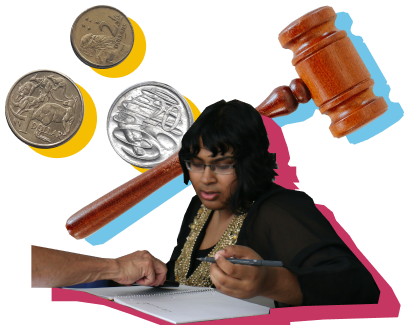Workplaces are complex. They are full of different personalities, expectations and dynamics.
While you can gain some incredible experience (and of course earn money), an important skill to learn is how to stand up for what you need.
30%
of all employed persons in Australia are young people aged 15-24
What are workplace rights?
You have the right to work in a safe and healthy workplace, free of discrimination and bullying.
What is discrimination?
Discrimination means being treated unfairly. It’s against the law for someone to treat you unfairly or bully you because of a personal characteristic that’s protected by law, such as your disability, race, religion, sex or sexual orientation.
It’s your employer’s job to make sure you feel confident completing the job you have been hired to do.
This means giving you the appropriate training, support, safe tools and equipment to complete your job safely.
WorkSafe Victoria oversees all workplace health and safety in Victoria. You can find out more information about workplace safety for young people on their website.
I wish I was more aware of the laws and regulations that protect workers.
What you should expect from your workplace
Every Victorian workplace should be:
- Free of discrimination (race/ethnicity, religion, accessibility, sexuality)
- Free of bullying
- Free of all forms of harassment (including sexual harassment)
Every worker has a right to:
- Be paid correctly and on time
- Feel safe and trained appropriately
- Join a union or not join a union
- Exercise your specific rights based on the terms of your employment (casual, part-time, full-time)
Look up your industry award to make sure you are getting paid what you should be.
Make sure you’re getting paid properly
In Australia, the government has set a minimum wage. This is to make sure everyone is paid a fair amount for the hours they work.
You can check your pay based on the terms of your employment using Find Your Award on the Fair Work website.
It’s really important that you are paid the right amount and on time. As much as you love your job, being paid correctly is the most important part.
Sometimes mistakes in your pay happen, especially if you have different shifts each week.
If something goes wrong with your pay, you can speak to your manager – or you may have to email the person that organises your pay and let them know your concerns.
Pay and tax can sometimes be confusing. So don’t feel bad if you need help understanding your pay and payslip.
It’s really important that you understand your pay and it’s your employer’s job to help you do that.
If you’re concerned that your employer is not supporting you to be paid properly, you can reach out to the Young Workers Centre for help.
Casual work: your rights
Casual work means any work that does not follow a regular pattern.
Being a casual employee can mean you earn more money (compared to part-time or full-time). But being a casual employee means you are not guaranteed work hours.
Victoria is the first state in Australia to provide paid sick leave for casual employees.
With casual work, an employer may stop giving you shifts. While this may be disappointing, it is legal. With casual employment, there is often no probation period.
Too many young people are exploited in the workplace, like being underpaid.
Part-time work: your rights
Part-time work is any regular pattern of work where you work less than 38 hours in a week (you may have the same shifts every week).
If you want to quit a part-time job, you need to ‘give notice’ (which means letting your employer know before you plan to leave).
The amount of time you need to give your employer may be different based on your employer and length of time employed.
Sick days, annual leave, carers leave and family violence leave are also provided.
Full-time work: your rights
Full-time work is usually a set amount of days and hours with an average of 38 hours per week.
Like part-time work, if you want to quit a full-time job, you need to ‘give notice’ (which means letting your employer know before you plan to leave).
The amount of time you need to give your employer may be different based on your employer and length of time employed.
Sick days, annual leave, carers leave and family violence leave are also provided.
No matter the terms of your employment, you are always protected under workplace laws.
Be wary of unpaid trials, unpaid internships or cash-only pay.
Bullying and problems at work
Hopefully it never happens, but sometimes you might work with someone that you don’t get along with.
It’s a normal part of life that not everyone is going to like you.
But there are certain expectations of co-workers and managers, and how everyone should treat each other in a workplace. No one ever deserves to feel unsafe.
Examples of workplace bullying or harassment
- Making fun of you in front of others, or making you feel like you aren’t smart
- Unwanted advances, touching or inappropriate comments
- Giving special treatment to other staff who work at the same level as you
- Mocking your culture or religion
- Denying breaks or requests for time off with no valid explanation
- Being deliberately excluded or ignored
- Being pressured to do unsafe work
You can learn more about the laws on bullying and harassment in the workplace by visiting the Fair Work website.
It can be really hard for young people to know how to exercise their rights in the workplace.
What to do if you feel like you are being treated unfairly
In the first instance, speak to your manager, rather than other co-workers.
It can make things worse if you start talking to everyone except the people who can help you.
If your manager is the one who is making you feel unsafe, you can either speak to another manager, someone from the head office, or the HR (human resources) team.
If you want some advice from someone outside of the business, review the common workplace problems section of the Fair Work website, or contact Fair Work and speak to someone about what you can do.
The role of unions
Unions are bodies that represent the interests of workers within different industries or occupations.
Unions can play key roles in workplaces including being able to resolve workplace issues by being a voice for employees and acting as a representative for workers during negotiations.
Other responsibilities of unions include ensuring employers are meeting their minimum obligations and looking into suspected breaches of workplace laws, discrimination laws and workplace safety laws.
All employees are free to choose to join or not join a union. It's illegal for a person to pressure another person about their choice to join or not join a union.
The Fair Work Ombudsman website has more information about the role of unions.
Remember:
- Bullying and harassment is never okay
- There is always someone to listen to
- Ask questions if you don’t understand
- Speak out to someone you trust
- Get help from the Victorian Human Rights and Equal Opportunity Commission

Ready to put your skills into practice?
Get comprehensive guidance on your rights at work at Youth Central.






